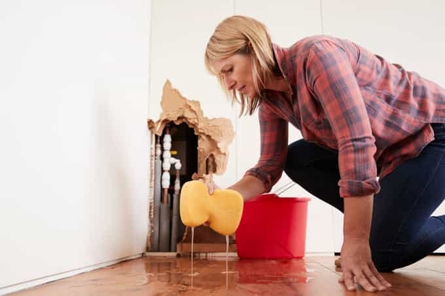In a climate like Indianapolis, with humid summers and cold, wet winters, insulation is vital for keeping homes energy-efficient and comfortable. When water damage affects insulation, it compromises not only comfort but also the health and integrity of your home. Water-damaged insulation can lead to mold growth, structural issues, and increased utility bills, making prompt attention essential.
Here, we'll explore the signs, risks, and appropriate steps to manage water-damaged insulation, plus when to call in professionals, such as ServiceMaster by LS James, for help.
Recognizing Signs of Water-Damaged Insulation
Water-damaged insulation often goes unnoticed until it leads to more visible issues, like mold or high utility bills. Indianapolis homeowners should watch for:
Increased energy bills: Water-logged insulation loses effectiveness, forcing your heating or cooling system to work harder.
Unusual drafts: Damaged insulation allows air leaks, making certain areas feel colder or warmer than others.
Damp spots or walls and ceilings: After heavy rains or plumbing mishaps, damp patches on walls or ceilings may indicate water is trapped in the insulation.
Humidity and frost: Basements in Indianapolis can stay humid, and frost on interior walls during winter can signal insulation issues.
Regularly inspect attics and basements, especially after storms or leaks, to spot trouble early.
Types of Insulation and How They Respond to Water Damage
Understanding how different types of insulation respond to water can help you assess potential damage. Here are the three common types and how they react to water:
Fiberglass Insulation: This insulation is common and can resist minimal moisture exposure but loses effectiveness when saturated. Wet fiberglass may also harbor mold if left untreated.
Cellulose Insulation: Made from recycled paper, cellulose is highly absorbent and prone to rot and mold when exposed to water, making it especially vulnerable.
Spray Foam Insulation: Though resilient, improperly installed spray foam can trap water, leading to hidden mold or moisture issues that weaken wall structures over time.
Indianapolis homeowners often have fiberglass or cellulose insulation due to their cost and availability, so understanding these materials’ vulnerabilities can help with early intervention.
Dangers of Ignoring Water-Damaged Insulation
Leaving water-damaged insulation unchecked poses serious risks:
Mold growth: Indianapolis’s humid environment can accelerate mold growth, risking respiratory health and spreading to other areas.
Structural damage: Wet insulation can contribute to wood rot and other structural damage, weakening your home's frame.
Energy inefficiency: Damaged insulation loses its thermal barrier, leading to higher heating and cooling costs—a significant issue in Indianapolis, where temperatures range from freezing in winter to hot in summer.
Addressing water damage in insulation can prevent these risks, but prompt action is key.
Immediate Steps Homeowners Can Take After Water Damage
If you suspect water damage in your insulation, take these immediate steps:
Turn off electricity in affected areas: Safety first—if flooding has occurred, ensure no live wires are in contact with water.
Ventilate the area: Open windows and run fans to reduce humidity and start the drying process.
Remove visible water: Use a wet vacuum if possible, but avoid disturbing the insulation directly, as this can release harmful particles.
Document the damage: Take photos and make notes for your insurance provider as you assess the damage.
Contact your insurance provider: Water damage claims vary by policy, so start the claim process early for a better chance at coverage.
While these steps can help minimize immediate risks, remember that insulation damage often requires professional evaluation to ensure no hidden hazards remain.
When to Call a Professional for Water-Damaged Insulation
While minor, recent water damage can sometimes be handled independently, certain cases need a professional touch:
Significant water exposure: Extensive damage often requires complete insulation removal, especially if water has seeped deep into walls or floors.
Visible mold growth: Indianapolis’s humidity makes mold remediation crucial, as spores can spread quickly if left unchecked.
Ongoing moisture issues: If the source of the water damage (such as a leaky roof or pipe) isn’t fixed, a professional assessment ensures the repair addresses the underlying problem.
A professional team can assess moisture levels, check for mold, and safely replace damaged insulation. In Indianapolis, ServiceMaster by LS James offers specialized expertise in assessing and repairing water-damaged insulation, using tools to detect hidden moisture and prevent future problems.
Why Indianapolis Homeowners Should Choose ServiceMaster Restore By LS James
ServiceMaster by LS James offers a comprehensive approach to water damage restoration, particularly for insulation issues. With local expertise in Indianapolis, their team understands the unique challenges of the region’s climate and housing structures.
Their services include:
Water-damaged insulation assessment and removal: Using advanced moisture-detection tools, they can determine the extent of damage and recommend effective solutions.
Mold remediation: Mold thrives in damp insulation, and their team is certified in safe, thorough mold removal to protect your home and health.
Fast and reliable restoration: Known for their commitment to quick service, ServiceMaster by LS James minimizes downtime to help your home get back to normal fast.
With proven methods, quality standards, and familiarity with Indianapolis’s environmental challenges, they’re a trusted partner for restoring your home’s insulation.
Water-damaged insulation can cause long-lasting harm, from structural risks to health hazards, if left untreated. Recognizing the signs and addressing the problem quickly is crucial, especially in Indianapolis, where weather extremes can exacerbate insulation damage.
If you suspect water-damaged insulation in your home, reach out to ServiceMaster by LS James for a professional inspection and solution. Taking action now can prevent further issues and keep your home safe, energy-efficient, and comfortable year-round.


